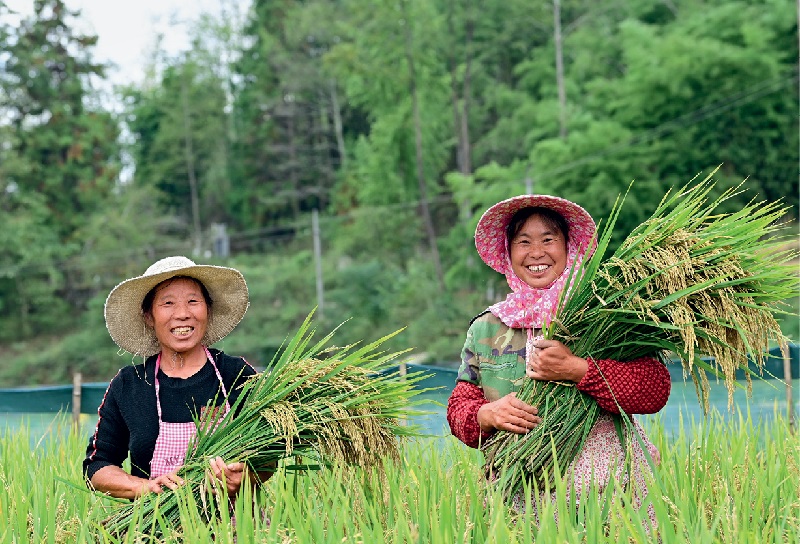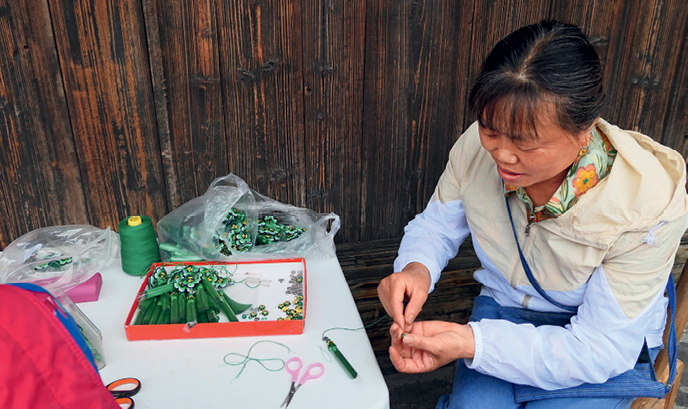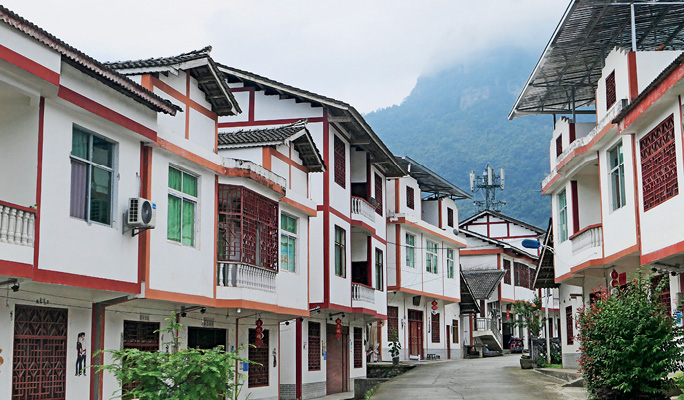
Two farmers harvest rice in the paddy fields which also raise river crabs. Photo courtesy of Guo Jing
Talented individuals are the key resource for China’s rural revitalization drive. In recent years, many people in Chongqing, the country’s southwestern megacity, have poured money and technology into the countryside and developed industries with local features. This has led to growing numbers of villagers finding new careers, becoming the new force behind these new rural industries.
Liu Yi: An Entrepreneur in the Tea Industry
Liu Yi used to be an employee of a grassroots grain station in Chongqing’s Xiushan Tujia and Miao Autonomous County. In 2000, due to the restructuring of the enterprise, Liu was laid off. He went through a stream of jobs, trying everything from working in transportation to contracting construction projects.
By chance, Liu chatted with friends about the supportive policies for rural businesses and the prospects of the tea industry. They unanimously believed that with the improvement of living standards, people’s demand for tea, especially high-end tea, would be high.
Liu and his friends arrived in Hong’an Town in 2010 to learn the skills used in planting tea. In 2011, they established their tea company, Chongqing Bianchengyun Tea Co., Ltd. “There was no tea industry here before. We leased 800 mu (53.3 hectares) of land from villagers at a price of RMB 260 per mu and made it into a tea planting base. We purchase tea from the farmers and sell it according to the market situation in different seasons, freeing the farmers from the stress of finding sales themselves,” said Liu.
Villagers who lease out their land receive a fixed annual rental income. They can also work for Liu’s tea planting base and earn an additional income of RMB 100 to 200 per day.
During the first few years after the establishment of the company, the locally produced tea had no branding, making it difficult to get consumer support. In order to build a trustworthy brand for the tea, Liu and his team have managed to improve the technology used in planting and processing, and have also taken the products to various expos for promotion. Some of the black and green tea products received awards from the China Tea Marketing Association and China (Sichuan) International Tea Expo.
At present, Liu’s company has annual sales of over RMB 12 million. Liu said that, in the agricultural industry, the early investment is large, and the return cycle is long, so it needs to withstand the growing phase. The company has benefited from the government’s preferential policies, and has expanded tea sales through cooperation with village collectives. Under the integrated model of land leasing, planting base management, tea processing, and fresh tea leaf picking and acquisition, the company is well placed to drive development of the tea industry, helping local and surrounding village farmers to increase production and income.

Tian Sumei teaches the traditional skill of Miao embroidery at Hejiayan Village. Dou Yi
Tian Sumei: Weaving a Happy Life
Miao embroidery in Youzhou has a long history. It originated from Chongqing’s Youyang Tujia and Miao Autonomous County. It is also among the sixth batch of municipal intangible cultural heritage of Chongqing.
Tian Sumei, 52, is a teacher of Miao embroidery in Hejiayan Village, Huatian Township, Youyang County. She used to live in the county’s Chetian Township, which was one of the 18 townships in Chongqing struggling with extreme poverty. In the past, transportation in the place was poor, and villagers could not develop local industries to rise out of poverty. In 2017, Chen Guotao, an inheritor of Miao embroidery in Youzhou, established a workshop for poverty alleviation in the township to teach Miao embroidery skills to local women for free, which aroused Tian’s interest.
Influenced by her family, Tian has liked embroidery since childhood. She could make embroidered dresses for herself when she was a teenager. “After joining the workshop, I learned more skills from Chen and her friends,” said Tian. At present, Tian can embroider not only small pieces, such as handkerchiefs and fans, but also large products, including hanging screens, fashionable clothes, and quilt covers.
In 2021, Tian followed Chen’s move to Hejiayan Village. In addition to creating her own embroidery work, Tian also teaches local women the skills she has learned. “The beginners cannot make complex products, so I teach them the skill of sewing small and simple accessories. The payment for each accessory is RMB 0.6. They not only practice the craftsmanship, but also earn at least RMB 50 to 60 per day,” said Tian.
She also said that she has enjoyed embroidering flowers and birds on her clothes since she was young. Now, she can do what her passion lies in and make money in the process. Tian and her husband can earn about RMB 6,000 a month, and usually have very little expenses. “I’m very satisfied with my current life,” she said.
Shen Zhongbin: Bringing Crab
Breeding Skills to More Farmers Shen Zhongbin hails from a coastal area in east China’s Jiangsu Province. He has more than 30 years of experience in river crab breeding. Previously, Shen worked in the trade in 13 cities and prefectures in south China’s Yunnan Province, helping more than 200 breeding companies, cooperatives, and farmers to increase production and income.
Three years ago, Shen was invited to Dahan Village, Heishui Town, Youyang Tujia and Miao Autonomous County, to provide technical support for local farmers in raising river crabs in paddy fields. “The water where crabs are raised here is clear and pure and comes from a mountain spring. It is ideal for growing rice while raising crabs,” said Shen.
Guo Jing, an official of Heishui Town, said that through the introduction of technical teams, experts stay in the village and help solve a series of problems with water storage and crab feeding. “The alpine hairy crabs grown in this environment following a scientific method contain high selenium and boast tender meat. Last year, we collected hairy crabs from different places and invited experts to taste them. Without us pointing out which crab is from Youyang, everyone could taste the difference and tell that those from Youyang are the best,” said Guo.
In September 2023, the hairy crabs produced in the rice paddies in Youyang will be available for sale. Guo has already contacted an e-commerce platform and logistics service providers. Guo believes that hairy crabs raising can become another unique industry to lead local people to prosperity.

A street view of the relocated Zhong-yuan Village down the mountain. Dou Yi
He Donglan: Living a Happy Rural Life
He Donglan lives in Zhongyuan Village, Shihui Town, Qianjiang District of Chongqing Municipality. She became a member of the Communist Party of China in 2006. Since then, she has been actively participating in village-level governance. “The policies and support of the Party and the government have improved my life, so I also want to do my part and lead fellow villagers to live a similar happy life,” she said.
Zhongyuan Village has in excess of 700 households with more than 2,400 residents. With more than 800 mu (53.3 hectares) of pepper fields and more than 1,200 mu (80 hectares) of land for sericulture, the village poses great potential for further development of local industries. Except a few families, most villagers have moved to new homes down the mountain as the local government supports them to get rid of poverty by relocating them to new residential areas with better facilities. For those who are not willing to leave their homes in the mountain, local government has improved their living environment by building roads, electricity, water supply, and internet connection among other infrastructure.
He Donglan and her husband are among those who stay as her mother-in-law does not want to leave her hometown. “The government has helped us renovate the house, and build infrastructure, such as concrete roads, water, electricity, and WiFi. Our life is much more convenient than before,” said He. In the past, it took her an hour to walk along the mountain road from her home to the town bus station. After the concrete road was repaired, the same trip takes only a few minutes.
He and her husband have a steady income every month. Her husband is a teacher. She works in a logistics company. She only works half a day every day, and earns RMB 3,000 to 4,000 each month. Their idle land has also been leased to the village collectives, which can earn the couple RMB 1,500 every year.
Their two daughters also have a bright future. Now, the oldest daughter works in another county, while the younger daughter is studying in the town. “If my daughters want to pursue their career or live a life outside the village, we respect their choices. If they want to come back, they can also live and work happily as life back here is also improving,” said He.